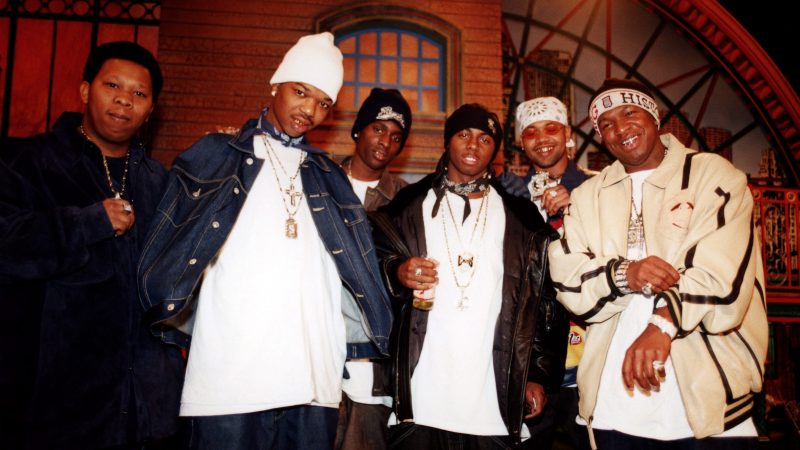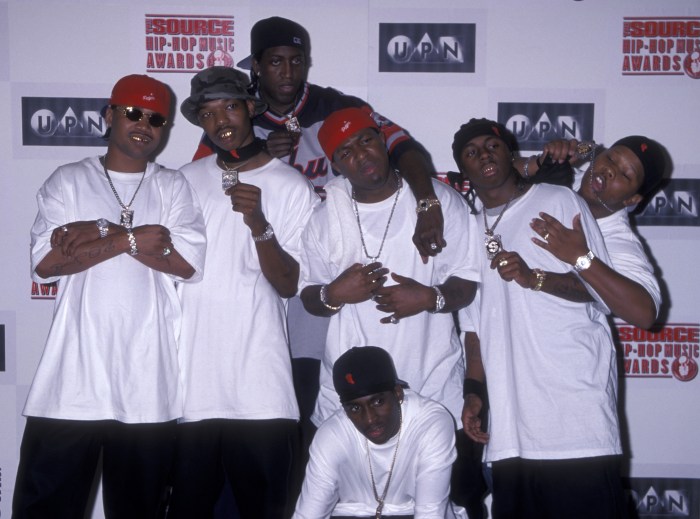Up Next
The Hot Boys reunion shouldn’t be taken for granted
The group’s Essence Festival homecoming is more than 20 years in the making

Lil Wayne’s Tha Carter celebrated its 20th anniversary June 29. While the album represented a sonic and lyrical shift forward for him, one song in particular was a nostalgic glance back at a previous chapter. “I Miss My Dawgs” was his love letter to his former labelmates — and more importantly — Juvenile, B.G. and Turk, his fellow Hot Boys.
“But every family ain’t filled with gangstas, that’s real/ And that’s real and I would never turn my back,” Lil Wayne rapped then. “Or turn you down even if you turned around, motherf—er / But history is history / I miss you and I know you missin’ me.“
Two decades later, the song — which Lil Wayne once performed with B.G. in the mid-2000s — is having a full-circle moment. All four members will reunite on stage in their hometown of New Orleans at the 2024 Essence Festival, which began July Fourth. The official billing calls the show a celebration of 30 years of Cash Money Records. Label co-founder Bryan “Birdman” Williams is the headliner, and Cash Money’s all-everything producer, Mannie Fresh, will appear. Yet, calling the reunion of one of rap history’s more celebrated and complex groups historic only tells half the story. It’s one of time, aging, and, surprisingly, one of a reunion that’s happening in the first place.
By the late 1990s, American pop culture had a boy band addiction. Groups such as the Backstreet Boys, N’Sync and 98 Degrees lived on shows such as MTV’s Total Request Live, but hip-hop’s chaotic and bouncing answer to cookie-cutter pop hits were the Hot Boys. They were young, intense, and extremely and unapologetically Black. To varying degrees, each member became a star on his own. As a unit, The Hot Boys were rock stars. Albums such as Get It How You Live!, Guerilla Warfare, 400 Degreez and Chopper City in the Ghetto were unrelenting. Singles like “I Need A Hot Girl,” “Back That Azz Up” and “Bling Bling” not only soundtracked the turn of the millennium, but they also altered the lexicon.
Grand success in the music industry is often the preamble for an even grander fall. The Hot Boys disbanded in 2003 after their final album, Let ‘Em Burn — and this is where the story becomes complicated. Turk was involved in a shooting with a Memphis, Tennessee, SWAT officer in 2004 and the incident would eventually land him in prison for nine years. B.G. and Juvenile blamed Cash Money Records’ alleged financial improprieties (a claim that has followed the label for most of its existence) for their exits. Lil Wayne called himself “a prisoner” to the label in 2014, marking the start of years of airing his grievances against the company he carried on his back for much of the 2000s. B.G. was sentenced to 14 years in federal prison in 2012 for possession of a firearm as a convicted felon. Lil Wayne — who eventually became the most famous Hot Boy — served eight months in Rikers Island following a gun conviction in New York. Juvenile is the only member of the group who hasn’t served time.
Because of this and the various animosities with the label and each other, an actual reunion has never occurred until now. (All four members did reunite on Turk’s song “Zip It” in 2012.) A homecoming of this magnitude happening at all is an act of God. Retrace the history of the Hot Boys, and the hit records and albums are the most famous chapters of the story. Nevertheless, it’s a depressingly dark story at points, too. Drug use plagued the group and essentially eliminated a lot of its potential. B.G.’s and Turk’s admitted use of cocaine and heroin were unavoidable issues within the label’s internal politics. They would later come to understand how those substances warped their careers and lives.
“[Birdman and Slim] wasn’t with it. They used to hate that s—,” Turk said in a 2022 Drink Champs interview. “Why would a person condone their money getting high when it’s f—ing their money up?”

Ron Galella, Ltd./Ron Galella Collection via Getty Images
“It started after one of my lil homies got killed, and he snorted dope. After his funeral, [we said], ‘We gon’ snort a bag for our partner,’ ” B.G. said in a 2009 interview, then six years clean. “I would’ve never started snorting dope [when I was 15] if I knew it was gonna take me on the road it took me down … It played a role in my career. It made me not as creative, not as heavy [into] hustle mentality [as] I would’ve if I was of sober mind.”
Even today, hurdles remain. Earlier this year, the expectation was that B.G. would have to return to federal prison after violating his probation. A probation officer said that B.G., now a Las Vegas resident, didn’t obtain proper permission to perform with Lil Boosie in February. On Tuesday, the situation was reported as resolved: B.G. wouldn’t have to return to prison, but he’d have to submit any lyrics he writes for songs to his probation officer for review. The decision calls into question an age-old argument that has only intensified over time regarding rappers, rap lyrics and how they are handled in the legal system. It’s another stark reminder that nothing has ever been a straight path northward for the Hot Boys — not even their success.
“We spoke about [doing a tour] a couple times. Everybody got situations — like B.G. just coming home. So he gotta work it out,” Lil Wayne said of a possible reunion. “Can he travel? Can he tour? Juvie ready. Turk ready. We just gotta see if Geezy can move around or not.”
Yet, success realized is still success worth celebrating. Juvenile’s late-career resurgence, led by his 2023 Tiny Desk performance and congressional resolution in his honor, warmed my heart. Lil Wayne’s peak is in the rearview mirror, but features on records such as Flau’jae’s “Came Out a Beast” prove that being a naturally gifted wordsmith will always be in his arsenal. And in a genre that has lost so many key figures at such young ages, all four Hot Boys on stage will be a critical moment. Groups like UGK, A Tribe Called Quest, Mobb Deep, De La Soul, and even R&B stars such as TLC are forever missing part of what made them legendary. And since this event will be held in New Orleans, the city the Hot Boys helped put on the world’s stage, only sweetens this gumbo-flavored pot.
“Me, Wayne, Turk and B.G., all of us gon’ be on stage with Mannie Fresh and Birdman,” Juvenile said in a video in June. “And we done already started working on the Hot Boys album.”
The Hot Boys grew up in a grotesque music industry, and there’s no way to value how much was taken from them. Their music was specifically graphic, giving listeners a glimpse into four young Black lives from the bottom of the map. But they are also Bayou artifacts. Ones who helped transform places like the Magnolia Projects, Hollygrove, and the 17th Ward from places of economic impoverishment into birthplaces of transformative art. Ones who made soulja rags and white t-shirts high fashion. Ones who had an entire generation of Black youth and young adults far beyond the Big Easy’s city limits calling themselves “hot boys” and “hot girls.” Ones who brought pride to their city — even while simultaneously carrying their demons, self-inflicted and societal — long before the New Orleans Saints won the Super Bowl. And ones who survived New Orleans when it was a murder capital and not the city most infamously associated with Hurricane Katrina.
“That Hot Boy s— still in me n—a, word to Giggity, n—a / And I ain’t got time to speak the history,” Lil Wayne rapped in 2004 on “I Miss My Dawgs.” “I miss you and I know you missin’ me.”
It only took 20 years, but now Lil Wayne can say this to their faces. Not every story ends like that.
